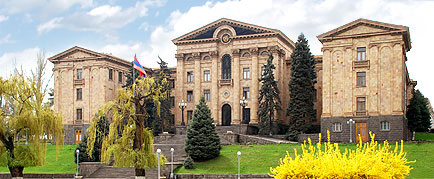On April 19 the second part of the eighth meeting of EU-Armenia Parliamentary Cooperation 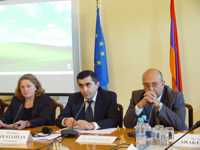 Committee, headed by Marie Anne Isler Beguin and Armen Roustamyan was held.
Committee, headed by Marie Anne Isler Beguin and Armen Roustamyan was held.
First, the issue on culture and historical heritage was debated. MP Heghine Bisharyan drew the participants’ attention to the Armenian cultural values, particularly to the cases of destruction of the cemetery and cross stones in Hin Jugha (Old Jugha), Nakhijevan, mentioning that cultural property are not of only national, but also of universal meaning.In her speech she highlighted the high quality of the Council of Europe, as a link between the two countries that do not have any relationships with each other. She also noted that the cultural massacre from the Azeris side impedes the solution of Artsakh issue and to the ways of cooperation within the framework of the European New Neighbourhood Programme. All this, according to Heghine Bisharyan, is the continuation of the genocide and crime towards whole civilized mankind. Robert Evans, member of the Committee, MP from Great Britain, noted that the Council of Europe had sent technically upgraded and expert-full mission to Nakhijevan region, to estimate on the spot the size of the damage. He did not mention the dates of the visit. He emphasized the necessity of history honouring. The Austrian Hans Swoboda noted that the protection of cultural values is an important element in the New Neighbourhood Programme. And no country, included in the Programme, can refuse the planned visit of CE mission to its territory and deprive of the right to get familiarized with the territory problem. According to the Austrian MP, we should be stubborn. Moreover, the CE should persist that cultural values protection will become a part of the Neighbourhood Policy Action Programme. The issue of protection of cultural heritage in this region is very important, whether it is Christian, or Muslim, concluded Mr. Swoboda. MP Koryun Arakelyan recorded that the Armenian culture in its essence is an ideology bearer of the European culture and we should honour each other’s history and values. He called for active steps in the issue of protection of cultural values. Hranush Hakobyan called the attention of those present to the necessity of the execution of international conventions’ demands, though they envision weak punitive measures for the destruction of cultural property. Hranush Hakobyan proposes the CE to authorize the execution of punitive measures for this kind of behaviour. Mrs. Beguin highlights the importance of cooperative efforts in the protection of European common heritage. In her opinion, the CE can create a committee, to conduct official investigation and, in case of necessity, to execute punitive measures. She suggested looking for the directions to give the solution of the issue within the framework of joint committee. At the end of the
Europe had sent technically upgraded and expert-full mission to Nakhijevan region, to estimate on the spot the size of the damage. He did not mention the dates of the visit. He emphasized the necessity of history honouring. The Austrian Hans Swoboda noted that the protection of cultural values is an important element in the New Neighbourhood Programme. And no country, included in the Programme, can refuse the planned visit of CE mission to its territory and deprive of the right to get familiarized with the territory problem. According to the Austrian MP, we should be stubborn. Moreover, the CE should persist that cultural values protection will become a part of the Neighbourhood Policy Action Programme. The issue of protection of cultural heritage in this region is very important, whether it is Christian, or Muslim, concluded Mr. Swoboda. MP Koryun Arakelyan recorded that the Armenian culture in its essence is an ideology bearer of the European culture and we should honour each other’s history and values. He called for active steps in the issue of protection of cultural values. Hranush Hakobyan called the attention of those present to the necessity of the execution of international conventions’ demands, though they envision weak punitive measures for the destruction of cultural property. Hranush Hakobyan proposes the CE to authorize the execution of punitive measures for this kind of behaviour. Mrs. Beguin highlights the importance of cooperative efforts in the protection of European common heritage. In her opinion, the CE can create a committee, to conduct official investigation and, in case of necessity, to execute punitive measures. She suggested looking for the directions to give the solution of the issue within the framework of joint committee. At the end of the 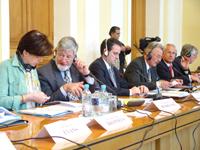 discussion a documentary film of the Armenian young director Taron Karapetyan on the Cultural property of Julfa and Jugha and their Destruction was screened.
discussion a documentary film of the Armenian young director Taron Karapetyan on the Cultural property of Julfa and Jugha and their Destruction was screened.
On the draft agenda the issue on the situation with regard to Nagorno Karabakh and latest developments was also put. Armen Roustamyan, Chairman of the NA Standing Committee on Foreign Relations prepared passed in the NA report on summing up the results of hearings on Karabakh conflict and passed to his colleagues. It includes the view of the Armenian side and it is a good analytical material for observers, though it reflects approaches of parliamentary diplomacy. In his opinion, it is important today to accurately evaluate what impedes the move of Karabakh problem solution into constructive stage. Mr. Roustamyan singled out two main factors to promote the regulation process. The first factor is to make the regulating process into real one, when the sides will honestly strive to regulate the conflict. From the first sight, the conclusion having glorious character is important, according to the Committee Chairman. Upon his clarification, Karabakh issue is of ethno political character, and from the very beginning the reason of the conflict should be eradicated. The reason, according to Armen Roustamyan, has a relation to Karabakh situation. The second factor is the effectiveness of the negotiation process. Negotiations will be without 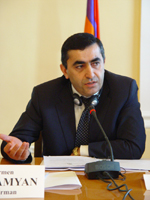 result, since the conflicting side - Karabakh, will not appear as negotiating side.
Without Karabakh, he thinks, that negotiations are absurd, especially when Karabakh side has already affirmed with signature such important documents, like the agreements on ceasefire and prevention of occurred events in the divisive line. Today, the negotiations are held around that issue. If we are interested in regulating the conflict, then from the beginning we have to ensure necessary conditions to resolve the conflict, thinks the Committee Chairman. The world community has to stress on these two issues, otherwise the Azeris are trying to develop events with their own scenario and make an impression, that without restarting the war they surrender to the Armenian side; that Armenia is an aggressor, and they are victims.
The speaker
also drew the Committee members’ attention to the day-by-day escalating warlike declarations in Azerbaijan, pointing that peace is needed not only for Armenia but also for the whole region. The Committee Chairman affirmed that it is not possible to use the Azeris’ side approaches in Karabakh issue: first to resolve all problems by stage option, and only then refer to the issue of the status. He presented once again the position of the Armenian side to regulate the conflict by package option.
result, since the conflicting side - Karabakh, will not appear as negotiating side.
Without Karabakh, he thinks, that negotiations are absurd, especially when Karabakh side has already affirmed with signature such important documents, like the agreements on ceasefire and prevention of occurred events in the divisive line. Today, the negotiations are held around that issue. If we are interested in regulating the conflict, then from the beginning we have to ensure necessary conditions to resolve the conflict, thinks the Committee Chairman. The world community has to stress on these two issues, otherwise the Azeris are trying to develop events with their own scenario and make an impression, that without restarting the war they surrender to the Armenian side; that Armenia is an aggressor, and they are victims.
The speaker
also drew the Committee members’ attention to the day-by-day escalating warlike declarations in Azerbaijan, pointing that peace is needed not only for Armenia but also for the whole region. The Committee Chairman affirmed that it is not possible to use the Azeris’ side approaches in Karabakh issue: first to resolve all problems by stage option, and only then refer to the issue of the status. He presented once again the position of the Armenian side to regulate the conflict by package option.
Mrs. Beguin referred to the issue, speaking about the necessity of weakening current tension. In her words, the Azeris side in its turn denies accusations in  escalating the tension directed to them. In her observation, the tension responsibility is on political figures and two conflicting sides have to form more tolerable public opinion in their countries. Arpad Duka-Zolyomi, Deputy CommitteeChairman, noted that the public opinion both in Armenia and Azerbaijan is strongly not ready for the proposed possible solutions. As a result of the last meeting of two Presidents of the countries, there was a call to governments to prepare communities to peace, and not to war. According to the Deputy Chairman, an agreement on some issues (on withdrawal of the Armenian troops from the ceasefire line, on the refugees’ return, peacekeepers’ deployment, in the issues of special status of some territories adjacent to Karabakh) was reached in France before the meeting of two Presidents. But the agreement on main issues (on referendum and on the withdrawal of the troops from Karabakh) was not reached.The issue on holding referendum in Karabakh and status decision, according to Deputy Chairman, must be the very last step. He highlighted the role and active efforts of Community in the issues of effective regulation of the problem. Hans Swoboda in is turn thinks unfair to put the solution responsibility on world community, saying that first these two sides have to find solution and prepare the society to compromises. He is for the
escalating the tension directed to them. In her observation, the tension responsibility is on political figures and two conflicting sides have to form more tolerable public opinion in their countries. Arpad Duka-Zolyomi, Deputy CommitteeChairman, noted that the public opinion both in Armenia and Azerbaijan is strongly not ready for the proposed possible solutions. As a result of the last meeting of two Presidents of the countries, there was a call to governments to prepare communities to peace, and not to war. According to the Deputy Chairman, an agreement on some issues (on withdrawal of the Armenian troops from the ceasefire line, on the refugees’ return, peacekeepers’ deployment, in the issues of special status of some territories adjacent to Karabakh) was reached in France before the meeting of two Presidents. But the agreement on main issues (on referendum and on the withdrawal of the troops from Karabakh) was not reached.The issue on holding referendum in Karabakh and status decision, according to Deputy Chairman, must be the very last step. He highlighted the role and active efforts of Community in the issues of effective regulation of the problem. Hans Swoboda in is turn thinks unfair to put the solution responsibility on world community, saying that first these two sides have to find solution and prepare the society to compromises. He is for the  involvement of the Karabakh side too in the negotiation process. At the same time, he considers necessary precondition that the people have opportunity to return to their homes. He believes that it is more difficult for Azerbaijan to come to mutual agreement, since they have lost territories and have a large number of refugees. In A. Duka-Zolyomi’s opinion, the upcoming parliamentary elections as well as presidential elections envisioned in both countries will put shade on the process of regulation of Karabakh issue, and the opportunity to come to an agreement will become difficult. In response to his question whether what kind of Karabakh status is acceptable for Yerevan, Mr. Roustamyan answered that the right for free self-determination should be applied without reservations. The acceptable option is independence, or the option, which Nagorno Karabakh will decide. Hranush Hakobyan called the Committee members to investigate the press field of both Armenia and Azerbaijan, to understand who is advocating for what. In her presentation, the experience of making a hero the Armenian military Officer Safarov, murdered in Budapest and the call of Azeri Ombudsman directed to the community to follow an example speaks as well. When the Azeri soldier destroys Jugha cemetery, we speak about state policy, mentioned Mrs. Hakobyan. She also stated that during 17 years Karabakh has changed the generation, and new generation does not understand how it will be possible to live under Azerbaijan’s dependence. Mrs. Hakobyan believed that Karabakh and Azerbaijan are of different, incomparable civilizations. Grigor Ghonjeyan expressed his disagreement regarding the opinion that the world community does not have responsibility to resolve the problem. That’s initially wrong, especially within the framework of the European New Neighbourhood policy, believed G. Ghonjeyan. Armen Bayburdyan, Deputy Foreign Minister, noted that there was an outline of conflict resolution in 2005, which though was denied by Azerbaijan. In his opinion, the expected oil sums and the perspectives of army strenghthening inspire Azerbaijan. According to this, the focus attention is changing, noted Deputy Minister. He also expressed an opinion that reopening of borders with Turkey will positively affect
involvement of the Karabakh side too in the negotiation process. At the same time, he considers necessary precondition that the people have opportunity to return to their homes. He believes that it is more difficult for Azerbaijan to come to mutual agreement, since they have lost territories and have a large number of refugees. In A. Duka-Zolyomi’s opinion, the upcoming parliamentary elections as well as presidential elections envisioned in both countries will put shade on the process of regulation of Karabakh issue, and the opportunity to come to an agreement will become difficult. In response to his question whether what kind of Karabakh status is acceptable for Yerevan, Mr. Roustamyan answered that the right for free self-determination should be applied without reservations. The acceptable option is independence, or the option, which Nagorno Karabakh will decide. Hranush Hakobyan called the Committee members to investigate the press field of both Armenia and Azerbaijan, to understand who is advocating for what. In her presentation, the experience of making a hero the Armenian military Officer Safarov, murdered in Budapest and the call of Azeri Ombudsman directed to the community to follow an example speaks as well. When the Azeri soldier destroys Jugha cemetery, we speak about state policy, mentioned Mrs. Hakobyan. She also stated that during 17 years Karabakh has changed the generation, and new generation does not understand how it will be possible to live under Azerbaijan’s dependence. Mrs. Hakobyan believed that Karabakh and Azerbaijan are of different, incomparable civilizations. Grigor Ghonjeyan expressed his disagreement regarding the opinion that the world community does not have responsibility to resolve the problem. That’s initially wrong, especially within the framework of the European New Neighbourhood policy, believed G. Ghonjeyan. Armen Bayburdyan, Deputy Foreign Minister, noted that there was an outline of conflict resolution in 2005, which though was denied by Azerbaijan. In his opinion, the expected oil sums and the perspectives of army strenghthening inspire Azerbaijan. According to this, the focus attention is changing, noted Deputy Minister. He also expressed an opinion that reopening of borders with Turkey will positively affect 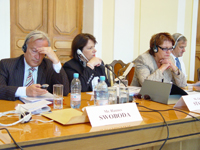 the negotiation process. Otherwise, the antagonism is sowing in the whole region. It became clear from Mrs. Beguin’s response that the reopening of borders with Armenia is an important precondition for Turkey on its way to become member of the European Union.
the negotiation process. Otherwise, the antagonism is sowing in the whole region. It became clear from Mrs. Beguin’s response that the reopening of borders with Armenia is an important precondition for Turkey on its way to become member of the European Union.
At the end of the eighth meeting of EU-Armenia Parliamentary Cooperation Committee a declaration and proposals resolution were adopted.
